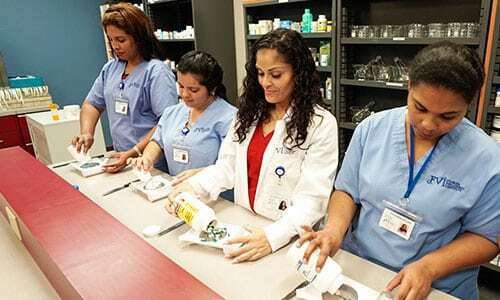Pharmacy Technician In High Demand
When you are considering possibilities for your future career, one primary decision-maker is usually “Is this field in high the market?” With the growing demand for healthcare services for people who are aging with higher incidences of chronic illnesses and chronic illnesses, there is a growing demand for prescription drugs and the professionals who provide these.
If you’re curious about learning more about what a pharmacist technician is, go to the Pharmacy Technology certificate enrollment page and sign up for our state of the art course brought to you by PharmTechEDU.
To answer your inquiry, “Are pharmacy technicians in need?” the short answer is yes. The more comprehensive answer is the fact is that not only do they have a increasing in number, but also their roles are changing with the industry of healthcare evolves.
Why are pharmacists In High Demand?
With an ageing population and rising incidences of chronic illnesses the outlook for job opportunities for health-related occupations from 2028 to 2018 is good. Health-related jobs are predicted to increase at a higher than the average across all occupations in accordance with the Bureau of Labor Statistics (BLS) “Occupational Outlook Handbook,” in addition to The BLS estimates that jobs for pharmacy technicians will grow by 7 percent through 2028[66.
There are many reasons pharmacist technician jobs are predicted to rise according to the BLS:
- The population is ageing and people who are older have more prescription drugs than younger ones.
- Research advances in the field of pharmaceutical research results in the development of more prescription drugs to treat illnesses.
- Pharmacists are taking on more clinical tasks for example, like giving influenza shots. This means that pharmacists will need to take on more administrative tasks.
Where do Pharmacy Technicians Work the most?
In May 2019 the five states that have the highest percentage of employees in this field are as according to the Bureau of Labor Statistics
- Texas
- California
- Florida
- Illinois
- New York

Where can Pharmacy Technicians work?
A majority of pharmacists are employed in the places you’d think — pharmacies and drug stores. Additionally, they work in different retail and healthcare environments.
- Drug stores and pharmacies 52 percent
- Hospitals 17%
- Stores for food and beverages Stores that sell food and beverages
Many of us have been to stores for retail pharmacy, such as Walgreens and CVS However, there are many other kinds of firms that produce and distribute medicines, including specialty pharmacies, compounding pharmacies, pharmaceutical companies clinics, as well as long-term care facilities[9[9, 10].
What Roles Have Pharmacy Technicians been Developed?
This is where the profession of pharmacy technician becomes exciting. If you take a look at the ways in which the roles of pharmacists and pharmacy technician have changed in recent years, it is clear that there is an increasing demand for hard knowledge.
Pharmacy Today, the official publication of the American Pharmacists Association, documented in the year 2018 how various states have expanded the scope of what pharmacists can do[1010. In certain instances, further training and certification or licensing is mandatory. For instance:
- California in 2007 enacted an act allowing pharmacy tech-check-tech laws which permits general hospitals with acute needs to hire pharmacists who are specially trained to examine medication cassettes and other technicians’ work.
- In Idaho pharmacy technicians are able to do accuracy checks on students and other pharmacy technicians. pharmacists.
- Iowa permits “checking” technicians. This is a credential that allows pharmacists to verify prescriptions.
- Ohio’s administrative code permits certified pharmacists to accept prescriptions for new ones from physicians as well as their office.
The Career Opportunities Growing For A Pharmacy Technician
If you’ve ever required medication, chances are you’ve had to speak with a pharmacy technician to purchase and then receive it. Pharmacy Technicians prepare medicines under the guidance of pharmacists. They mix, measure with, count out, label and track dosages and amounts of drugs in accordance with prescription instructions. There are about 8 050 pharmacy technicians in Minnesota employed in pharmacies , drug stores as well as hospitals, grocery and food stores. Pharma Technicians are projected to grow by 7.2 percentage between 2018 to 2028 with an increase of about 600 jobs. Furthermore, there is predicted to be a requirement for more than 2,500 of these technicians to fill the positions that are empty due to the unemployment.
There are many tasks Pharmacy Technicians carry out in their daily tasks. A few of them include checking that refill or prescription requests are accurate and complete as well as maintaining the appropriate storage and security conditions for medications, helping customers with queries on the telephone and operating cash registers and making medical insurance applications, as well as other required documentation, and keeping work areas clean and maintained. The ability to use technology is essential since many tasks will require a computer as well as various other software like pharmacy management software or any other software for medical use, label maker applications, sales programs and spreadsheets and word processing software. The most important qualities needed by pharmacists are also detail-oriented ability to organize, organizational skills, listening skills, as well as customer service.
Pharmacy Technicians are popular in Minnesota which is ranked 15 the position in DEED’s list of highly-demanded professions. This list comprises over 560 other occupations. DeED’s Employment Vacancy Study has revealed that there were more than 700 job opportunities for pharmacists in the 4th quarter of 2019. The occupation was characterized by a unemployment rate of 9.5 percent, which is much greater than the 4.5 percent rate for all jobs. This percentage reveals the amount of vacant jobs compared to the total number of jobs filled within the field, with Pharmacy Technicians’ significantly higher vacancy rate, which reflects the job’s high demand on the market for labor.
The year 2021 saw half of pharmacists in Minnesota earned a salary of $19.08. Technicians employed in Minnesota received hourly pay of $16.16 to $23.17. The median hourly pay of the profession was $19.08. The wages for this profession are fairly similar throughout various regions of Minnesota but the highest median salaries are located in the Seven-County Metro Area ($19.78) and Southeast Minnesota ($19.11).
To become a pharmacy technician generally, you need an high school diploma or equivalent. Many states also have regulations for pharmacists, which could be required to pass an exam as well as an identity check, as well as taking a continuing education course. Many may opt to work in this field after they have completed postsecondary programs in pharmacy technology. The program can culminate in the award of a certificate or Associate Degree.
If you’re looking for more details on the possibilities of becoming pharmacists, look out the the Pharmacy Technician occupation page on the CareerForceMN.com site for salary ranges education or training necessities, the latest job openings in Minnesota and much more.
How to become an Pharmacy Technician

The majority of pharmacy technicians require the equivalent of a high school diploma equivalent. They are trained to perform their tasks via on-the job training or they could take a postsecondary course for pharmacy technicians. Many states have regulations for pharmacists, which is an act that requires passing an exam or formal education or a training program.
Training
 Others begin their careers after completing postsecondary education courses that focus on pharmacy tech. They are usually provided by community colleges or vocational schools. Most programs grant a certificate within a an year of study, however some programs are longer-lasting and may lead towards an Associate’s Degree. They cover a wide range of topics, like the use of arithmetic in pharmacies and record-keeping, methods to dispensing medication, and ethics and law in the field of pharmacy. Technicians also learn about names, functions and dosages of medicines. The majority of programs include the opportunity to participate in clinical experiences, where students get the experience of working in pharmacies.
The American Society of Health-System Pharmacists (ASHP) is the only organization to accredit pharmacy technician training programs that require at minimum 600 hours of training in a minimum fifteen weeks. In 2017 there were 309 accredited programs that were fully accredited, including some that are in drugstore chains with retail stores.
Others begin their careers after completing postsecondary education courses that focus on pharmacy tech. They are usually provided by community colleges or vocational schools. Most programs grant a certificate within a an year of study, however some programs are longer-lasting and may lead towards an Associate’s Degree. They cover a wide range of topics, like the use of arithmetic in pharmacies and record-keeping, methods to dispensing medication, and ethics and law in the field of pharmacy. Technicians also learn about names, functions and dosages of medicines. The majority of programs include the opportunity to participate in clinical experiences, where students get the experience of working in pharmacies.
The American Society of Health-System Pharmacists (ASHP) is the only organization to accredit pharmacy technician training programs that require at minimum 600 hours of training in a minimum fifteen weeks. In 2017 there were 309 accredited programs that were fully accredited, including some that are in drugstore chains with retail stores. Licenses, Certifications and Registrations
The majority of states regulate pharmacy technicians in some manner. Check with the state Boards of Pharmacy for particular guidelines. For pharmacy technicians, the requirements in state that oversee them generally contain some, or even all:
- Diploma from high school or GED
- A formal education or training program
- Exam
- Fees
- Continuous education
- Criminal background checks
Certain state and employer requirements require pharmacies technician to obtain certification. Even if it’s not mandatory, certification can aid in obtaining the job you want. Employers of pharmacy technicians pay employees to pass the exam for certification.
Two organizations provide certification. For the Pharmacy Technician Certification Board (PTCB) certification requires an high school diploma as well as the passing of an examination. Candidates for National Health Career Association (NHA) certification must be 18, possess an academic diploma from a recognized high school, having completed a formal training program or have one year of experience in the field. Technicians are required to renew their certification every two years after completing the required 20 hours in continuing education.
Important Qualities
Skills for customer service. Pharmacy technicians spend a lot of interactions with customers, and being friendly and courteous is an essential requirement of pharmacists in retail settings.
Detail-oriented. Serious health issues can arise from errors when prescribing medications. Although pharmacists are responsible to ensure the safety of the medications they dispense. Pharmacy Technicians must be aware of the specifics so that they can avoid complications.
Skills for listening. Pharmacy technicians must be able to communicate clearly with doctors and pharmacists when receiving prescription orders. When they speak to customers, the technicians need to be attentive to listen to customers requirements and decide whether they should speak with pharmacists.
Skills in math. Pharmacy technicians require a thorough understanding of the mathematical concepts that are used in pharmacies, such as taking pills or compounding medicines.
Skills in organization. Working as pharmacists requires balancing various duties. Technicians in the field of pharmacy require good ability to manage their time to complete the tasks assigned by pharmacists while at while providing support to patients or customers.
